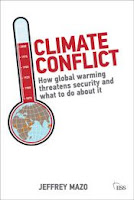Yesterday, Forbes.com published a column by Larry Bell, “Disarmament in America’s Energy Security Battles”. I thought it was extraordinary, even by the low standards of opinion journalism, in its blatant disregard for the facts. So, I wrote to Forbe's editors, in order to correct the record. I've copied the letter below.
I am writing in response to Larry Bell’s November 18 column, “Disarmament in America’s Energy Security Battles” printed on Forbes.com. This column is notable for its lack of facts and its assertions against renewable energy that simply do not have a basis in reality. Mr Bell uses hyperbolic language and assertions that are simply not backed-up by the facts.As a favor, then, to Forbes’ editors and readers, I will attempt to put some real facts behind his statements, then you can determine whether his assertions are correct, or just hot air. As the author of “Learning from Europe on Climate Change” in the December 2009 issue of Survival, I am well-placed to offer informative, fact-based analysis of energy security and climate policies. I would appreciate it if you would print my response in full.
 |
| An unfairly maligned Spanish wind farm |
First, Mr Bell asserts that the EU is facing “costly, yet unsuccessful, CO2 emission reduction efforts.” In fact, the opposite is true – the EU has been successful in reducing its emissions, and at low cost. Last month, the European Commission released a report stating that, by 2012 (the date for compliance with the Kyoto Protocol) the emissions of the EU-15 (the 15 Western European countries) will be 10.4% below 1990 levels, and the emissions of the EU-12 (the 12 former East Bloc countries) will be 36.8% below 1990 levels. This means that the EU as a whole will reduce its emissions 17.3% below 1990 levels. Alone among major developed economies, the EU will meet the emission reduction commitments it made when it signed the Kyoto Protocol. In Europe, it is true, the cost of energy – both electricity and gasoline – is generally higher (rates vary greatly throughout the EU), but that is the result of long-standing government policies that encourage energy security, not a recent increases from climate policies. In France, for instance, the cost per KWh of electricity is about 19.25¢, while in the USA, it is about 10.45¢.
Mr Bell then goes on a rant against the wind industry. It is true that wind energy requires high up front infrastructure costs, but he does not acknowledge that once they are running, there are no fuel costs – which can fluctuate widely – as there are with traditional electricity power plants. He then cites a report from Spain, repeatedly pushed by the right-wing Heritage Foundation, that has been widely debunked as based upon flawed analysis and untrue foundations. For instance, the report estimates that Spain’s renewable program created only 50,000 jobs, when official estimates are 188,000. The argument they make is that supporting renewable energy destroys jobs by causing the loss of 2.2 jobs for every 1 created. It is based on flawed analysis, and it just goes to show that you can always find an economist to support your view. It doesn’t make them right, though.
Mr Bell then states that “high wind power premiums” get passed onto customers, while talking about wind farms in Texas. What he doesn’t mention is that in his home state of Texas, the state with most installed wind power – about 8 gigawatts – the Public Utility Commission said “Wind generation has had the impact of reducing wholesale and retail prices of electricity.”


